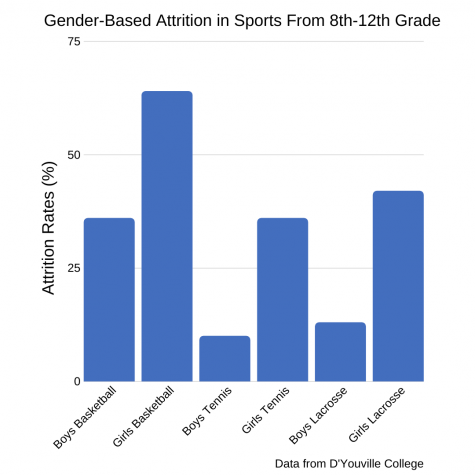Striking down sexism in sports
December 10, 2019
A few weeks ago, I was scrolling through Instagram and came across a Bleacher Report post announcing that Elena Delle Donne had won the WNBA MVP award. “Unreal numbers,” the caption said, citing her 97.4% free throw percentage. “1st to win MVP on two different teams.” But as I scrolled through the comments, my heart sank. “What did she cook?” someone commented. “She’s fine tho,” another remarked.
These reactions are the norm, not the exception. Look up any social media post about female athletes and chances are you’ll find a plethora of comments mocking their accomplishments, commenting on their sandwich-making ability or objectifying their appearance. In our society, female athletes and their accomplishments are almost never given the credit they deserve — a societal attitude that has a real-life, negative impact for females in sports.
Traditional stereotypes of femininity often trap athletes in unfair double standards. Females are often expected to be quiet, submissive and weak. But sports necessitates that female athletes show physical strength, and high stakes games and competitions often put them in very emotional situations — hardly lending itself well to the idea of a “proper woman.” Take Serena Williams, one of the greatest tennis players of all time, but also one of the most controversial. In the 2018 U.S. Open, Williams lost the final round against Naomi Osaka, in part because of violations that included arguing with an umpire and breaking a racket on the court in frustration. People across the internet instantly pounced on the match as a sign o f Williams’ unhinged nature and lack of sportsmanship. “Serena Williams blows her top,” one title from the Guardian proclaimed.
f Williams’ unhinged nature and lack of sportsmanship. “Serena Williams blows her top,” one title from the Guardian proclaimed.
Yet, similar behavior is condoned or even celebrated among male tennis players like Dominic Thiem, known for destroying rackets during matches. During the very same tournament, in the male division, news articles lauded him for giving a smashed racket to a fan. While Serena’s behavior is perceived as overly emotional, players like International Tennis Hall of Famer John McEnroe are known and loved for the “entertainment” and “passion” their angry outbursts provide. Notwithstanding whether this behavior is justified, there should at least be a uniform standard that all genders are held to.
Some justify comments degrading female athletes as “just a joke.” But these remarks have far-reaching implications. Imagine being a young female athlete seeing a role model of yours achieve something significant, only for thousands of strangers to dismiss her accomplishment, invoke dated gender stereotypes or make vulgar comments about her body. At that point, a professional sports career probably seems decidedly less glamorous — after all, there’s no point of reaching the professional level if you’re never taken seriously.
A 2014 study by D’Youville College finds that attrition rates in sports (the rate at which athletes leave their sport) are significantly higher among girls. In all sports among girls between eighth and 12th grade, attrition rates are two to three times that of boys. Research from the Women’s Sports Foundation isolates social stigma, as well as the scarcity of female role models in sports, as two key reasons why girls drop out of athletics. Evidently, these comments aren’t just jokes; they clearly create a culture where girls feel unsafe following their passion in sports, deterring female participation at large. And regardless of the effects on attrition rates, these jokes are inherently sexist and should be eradicated. The momentary gratification a comment may yield isn’t worth the unwelcoming environment it creates for these athletes.
In addition to how society devalues female athletes perceptually, it also literally devalues them, as seen through the massive pay gaps between male and female sports. Perhaps most well known is the pay disparity in U.S. soccer; the women’s team received a combined $1.725 million for winning the 2015 World Cup, while the men won $5.375 million just for advancing to the round of 16 in 2014. The problem extends beyond soccer. WNBA players earn just 20% of the salaries of NBA players, and even when considering that the NBA brings in more revenue, WNBA players only receive 20% of their league’s revenue, compared with 50% for NBA players. Almost three-fourths of WNBA players play overseas during the offseason to make up for the inadequate pay, spending months away from their families — not to mention the toll it takes on their bodies.
Sexist perceptions of female athletes by managers and executives are a significant factor contributing to pay disparities. But the general public’s attitude towards these athletes doesn’t help either; if we don’t give female sports the respect and attention they deserve, leagues are emboldened to mistreat their players, knowing that public backlash will be minimal. Sexism renders proper investments into female sports less profitable, and thus less likely.
Our society needs to change the way we value female athletes. Rather than playing a game of comparison to justify discrediting the victories of female athletes, we should celebrate them just as much as their male counterparts. These athletes perform superhuman feats — they deserve our respect, regardless of gender.

